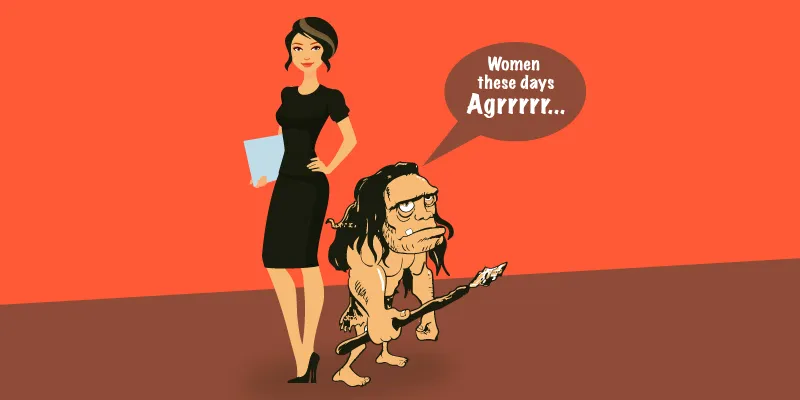Now playing, how to deal with a 'heterosexual' boss
With the recent allegations of sexual harassment against The Viral Fever’s Arunabh Kumar, the can of worms has been reopened.
'Why break your silence after all these years?' 'This is a conspiracy to malign a powerful man.' 'From the conversation, it appears she was leading him on.' 'Why can't women take a compliment?' 'Why did she stay back so late in the office?' 'Why did she go up to his hotel room to meet him?'
Why? Why? Why?
The jury is out yet again.

With the recent allegations of sexual harassment against The Viral Fever’s Arunabh Kumar, the can of worms has been reopened. An anonymous post by Indian Fowler on Medium on Sunday night accused him of molestation and harassment lasting more than a year, alleging that she was prevented from leaving because of a binding contract she had with the company.
The company issued a ‘threatening’ response to the post saying it was “ludicrous” and “defamatory” and that “We will leave no stone unturned to find the author of the article and bring them to serve justice for making such false allegations.”
Yesterday, Nidhi Bisht, a core member of TVF, put out this post on her Facebook page giving her side of the story and standing up for her organisation’s culture as “one of the best places for women to work.” She claimed she had dismissed the allegations in the anonymous post as there was no person fitting this description in the company, past or present. She goes on to say that “Subsequently, a few more posts have started coming out on social media regarding misconduct on Arunabh's part. I am as shocked as you guys are.
“Let me clarify that TVF has zero tolerance towards workplace harassment, and an investigation will be conducted and appropriate actions will be taken. We have a Prevention of Sexual Harassment committee, backed by Legal and HR, which deals with such issues.”
YourStory spoke to Nidhi over the phone and she said that she has known Arunabh for the past nine years and was shocked by the allegations. “I am not ridiculing anyone, and I just want to state that if there is any formal complaint filed by any of the women, I will ensure that the organisation helps them all the way. My request is please do not equate the company with the individual,” she added.
At the time of publishing this, Arunabh Kumar had not replied to YourStory’s email asking him to comment on the allegations. However, he reportedly told a newspaper,
"I am a heterosexual, single man and when I find a woman sexy, I tell her she's sexy. I compliment women. Is that wrong? Having said that, I am very particular about my behaviour."
What the law says
Give it one more day and the heat on social media will evaporate, replaced by outrage on some other issue.
But the question remains how can women (or even men) address the issue of sexual harassment in the workplace? To get this answer let us first understand what constitutes sexual harassment, and how organisations should respond to allegations so that justice is served.
As per the Vishaka Guidelines, which was converted into the Sexual Harassment of Women at Workplace Act, 2013, “Sexual harassment includes such unwelcome sexually determined behaviour (whether directly or by implication) as:
- a) Physical contact and advances;
- b) A demand or request for sexual favours;
- c) Sexually coloured remarks;
- d) Showing pornography;
- e) Any other unwelcome physical, verbal or non-verbal conduct of sexual nature.
“Where any of these acts is committed in circumstances where-under the victim of such conduct has a reasonable apprehension that in relation to the victim’s employment or work whether she is drawing salary, or honorarium or voluntary, whether in government, public or private enterprise such conduct can be humiliating and may constitute a health and safety problem. It is discriminatory, for instance, when the woman has reasonable grounds to believe that her objection would disadvantage her in connection with her employment or work, including recruiting or promotion or when it creates a hostile work environment. Adverse consequences might be visited if the victim does not consent to the conduct in question or raises any objection thereto.”
The law mandates that every organisation with 10 or more employees has to set up an Internal Complaints Committee that should include at least 50 percent women members. The names of the committee members along with their contact details should be displayed prominently.
Need to be open
Anu Acharya, Founder and CEO of MapMyGenome, feels that the Vishaka Guidelines can be improved by (a) not making it gender specific, (b) giving a legal recourse to leave the company/ other legal action if faced with issues that cannot be corrected by the company, (c) definition of sexual harassment.
“It is important for founders to create a culture where employees can discuss issues like sexual harassment openly not just with HR but with the founder,”
says Anu, adding that if there is a case, it must be dealt with immediate action so that no other person suffers from harassment in the future.
Serein, a consulting firm based in Bengaluru, that uses a data-driven approach to help companies build diverse and inclusive teams, did an extensive campaign writing to many startups to spread an awareness about the Sexual Harassment of Women at Workplace Act, 2013, after Uber’s Susan Fowler blog went viral.

According to Chryslynn D'Costa, Head: Diversity and Inclusion at Serein, “Some companies believe that merely having an anti-sexual harassment policy or forming an internal committee (IC) implies compliance with the law. They overlook the mandates and importance of (a) Training internal members on the law and procedure to deal with a complaint. The law is extensive and the nuances of the dealing with each case requires proper training to do justice to implementation, (b) Mandate of an external member on the IC panel for unbiased judgment, (c) Gender sensitisation for all employees.”
A common misconception of many employees is that the law only covers physical forms of misconduct. She told YourStory,
“Often women employees are uncertain as to what can be reported and the process of making a complaint. Employees are unaware of the definition of verbal and non-verbal forms of sexual harassment or what constitutes workplace under the law.”
Another assumption is that only companies with women employees are required to implement the law. They do not realise that any woman facing harassment from either other employees, employers, and even clients in the context of work can file a complaint. She added,
“In our extensive campaign it was also encouraging to see many startups reach out to inquire about the law and what they can do to make their women employees feel safe and build inclusive cultures.”
According to a study by FICCI and EY, 36 percent of Indian companies and 25 percent of multinational corporations in India are not compliant with the Act. But many people that YourStory spoke to say that on paper everything looks good. It is the implementation that is the challenge. Organisations are still under the impression that Vishaka Guidelines are merely a set of guidelines. They do not realise that it is a mandate now under the Sexual Harassment of Women at Workplace Act, 2013.
Aneesh Reddy, Co-founder and CEO of Capillary Technologies, who also works closely with iSPRIT, says when it comes to such issues, there should be a zero-tolerance policy.
“Some of us founders are coming together to take a pledge on zero tolerance towards sexual harassment,”
he tells me. Capillary Technologies works closely with an external agency for the implementation, training, and workshops to address issues related to sexual harassment at the workplace. “We have firmly dealt with any complaints that have come to us,” he says, adding that at present they have 23 percent of women employees and they hope to increase this to 30 percent by next year.
Kalpana Tatavarti, Founder of Parity Consulting and Training, who works on gender inclusion and women leadership, says, taking to social media is the last thing that women should do, and it is not a fair process for either party. “You are exposing yourself to libel by doing that. Go to a place where you will get justice.” She states there is a total lack of awareness around how to approach sexual harassment both from the aggrieved party’s side as well as the organisation's.
So what's stopping them from reporting?
Besides a lack of awareness, there are many misconceptions to sexual harassment as well. According to Chryslynn, “We find that so many times men do not even realise they are saying something that may be objectionable to their woman colleagues. It is important that organisations, especially startups that employ young people, conduct training and workshop on consent to make people aware.”

Giving an example from a training workshop, she says the men told her they were only paying women a compliment because women expect one. "There is so much misconception about these things. The same men said at the workshop that they would never give a guy a compliment," adds Chryslynn.
After YourStory wrote about the sexual harassment allegations last month, we received a spate of replies from women saying that either they or women they know had gone through a similar experience. In a survey form released with the story, we had asked what was the nature of the harassment, and if they reported the incident.
Eighty-three percent respondents said they encountered sexual harassment at the workplace. To the question whether any action was taken, the reply was a 100 percent resounding 'no'. 66.7 percent respondents were from the startups and 33.3 percent from the corporate.
Some examples of the respondents’ replies to the nature of the harassment included:
- Sexual jokes by the boss, where we all must join and laugh.
- A person close to management sexually abuses several freshers. Touching is taken for granted for him. We can't tell anyone, so I moved out of the company. One case where the person complained she was moved to some other department.
- Head of HR (who was married, had kids) tried to act romantic.
- Misbehaviour and requests for favours.
- Flippant sexist remarks.
It is interesting to see why they did not report the crime.
- No clue where to report or if I even should. What if I'm kicked out of work? It's a small company of eight/nine people, hence no support. No proof except for the word of my colleagues, who again probably won't speak up because their job will be at stake.
- I'm too junior. When I told other colleagues, they said he is close to management and no one can do anything. I would be thrown out for poor performance.
- I thought it would taint my image in the company.
- The people I spoke to did not wish me to go public saying it will earn me a bad reputation.
- I thought I was from a conservative family and everyone else has a western mindset.
Young women, as much as young men, have a right to be ambitious and make their professional dreams come true. Besides a host of socio-cultural biases, sexual harassment at workplace puts women at a disadvantage. It is high time workplaces take this seriously.
Probably, a good time for Girliyappa, a woman-centric channel by TVF, to come out with a web series on how to deal with a 'tharki' boss.
(If you have experienced sexual harassment at the workplace, please take this survey and help us document this study in detail.)
Which domain name would you choose for your website? Click here to tell us.







